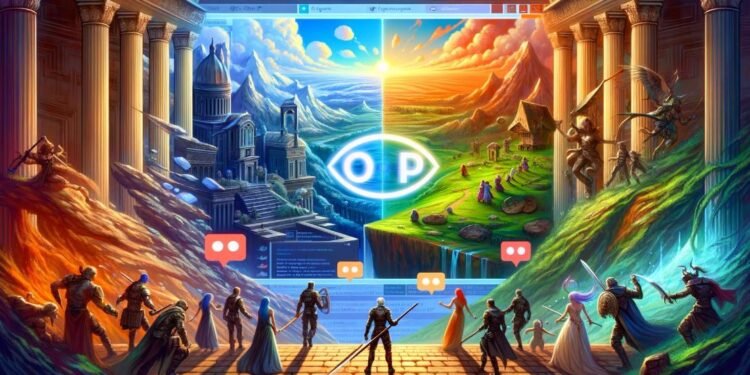The term “OP” permeates modern digital and gaming culture, a concise yet expansive time with various meanings and implications. Understanding the roots, evolution, and application of “OP” provides a window into its significance in the contemporary lexicon and subcultures.
The Etymological Roots of “OP”
Early Usage and Transition into Digital Vernacular
The term “OP” initially had no association with the digital world. Originating from the Latin ‘opus,’ which means a work or composition, it transitioned into various forms in different languages. In English, “op” was commonly seen as an abbreviation for ‘operation’ or ‘operator,’ used in military, medical, and technological contexts. However, with the advent of the internet and digital culture, “OP” found new ground, evolving into a term with distinct meanings and uses.
From General Usage to Online Slang
As online forums and chat rooms gained popularity in the late 1990s and early 2000s, “OP” began its journey as internet slang. In these digital communities, it was commonly called the “Original Poster” or “Original Post,” indicating the person who started a thread or discussion. This use was particularly prevalent on platforms like Reddit, 4chan, and other similar forums. The efficiency and clarity in online conversations made it a staple in internet communication.
OP in the Gaming Universe
The Emergence of OP in Gaming Terminology
With the explosive growth of the gaming industry, “OP” found another domain where it flourished. In gaming, “OP” is widely understood to mean “overpowered,” referring to a character, item, or strategy that is too strong or unbalanced compared to others. This usage reflects the dynamic and competitive nature of gaming, where balance and fairness are paramount.
Case Studies: OP in Game Balance
In popular games like “League of Legends,” “Dota 2,” and “Fortnite,” the term is frequently used when discussing game mechanics. For instance, a newly released character might be termed “OP” if its abilities significantly surpass those of existing characters. Game developers often have to adjust or ‘nerf’ these elements to maintain game balance, a process heavily influenced by community feedback often expressed through terms like “OP.”
The Sociocultural Impact of OP
OP as a Reflection of Digital Culture Dynamics
“OP” isn’t just a term; it reflects the evolving dynamics of digital culture. Its usage signifies a community’s shared understanding and collective experiences. For instance, calling something “OP” in a gaming context is not just a comment on game balance but also a part of the shared language gamers use to connect.
The Role of OP in Online Communities
In online forums and discussions, referring to someone as the “OP” creates a sense of order and hierarchy in conversations. It acknowledges the originator of the meeting, emphasizing the importance of the initial post or query. This usage is crucial in large threads where numerous users participate, as it helps maintain the coherence and flow of discussions.
Linguistic and Psychological Perspectives on OP
The Linguistic Evolution of OP
From a linguistic standpoint, the evolution of “OP” is a fascinating example of how language adapts and evolves. It showcases how terms can develop new meanings and uses, influenced by technological advancements and cultural shifts. The brevity and adaptability of “OP” make it an interesting case study in modern linguistics, particularly internet linguistics.
Psychological Implications of Using OP
Psychologically, using terms like “OP” in online communication can influence how individuals perceive and interact with each other. For instance, in gaming, calling something “OP” can be a form of social bonding or a way to express frustration. In online forums, using “OP” to refer to someone can create a sense of respect or authority for the original poster. These nuances highlight the subtle yet significant impact of language on online interactions.
The Future of OP in Digital Lexicon
Predicting the Evolution of OP
Predicting the future trajectory of terms like “OP” is challenging, as it depends on the unpredictable nature of digital culture and language. However, it’s likely that “OP” will continue to evolve, finding new meanings and uses as technology and online communities develop. It’s possible that “OP” could be adopted in other contexts outside of gaming and online forums, further cementing its place in the digital lexicon.
The Continued Significance of OP in Online Discourse
Regardless of its future evolution, “OP” will remain a significant term in online discourse. Its journey from a simple abbreviation to a time rich with cultural and contextual meaning exemplifies the dynamic nature of language in the digital age. As online interactions continue to be a crucial part of everyday life, terms like “OP” will play a vital role in shaping and reflecting our digital culture.
Conclusion
In conclusion, the story of “OP” is more than just the history of a term; it’s a narrative about the intersection of language, technology, and culture. As digital platforms evolve and new forms of communication emerge, “OP” and similar terms will remain at the forefront of this exciting and ever-changing landscape.
Also, Read Exploring the 619 Area Code: Detailed Map, Time Zone Insights, and Comprehensive Phone Lookup Guide.


















